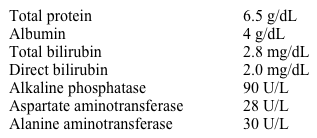A 20-year-old man is evaluated in the clinic due to intermittent episodes of self-resolving jaundice. His symptoms are not provoked by any particular circumstances or events. The patient otherwise feels healthy and has no other symptoms. He does not use tobacco, alcohol, or illicit drugs. Complete blood count is within normal limits. Liver function studies are as follows:  Liver biopsy shows abundant pigment inclusions in the lysosomes of the otherwise normal hepatocytes. Electron spin resonance spectroscopy reveals that the pigment is composed of polymers of epinephrine metabolites. Which of the following is the most likely cause of this patient's jaundice?
Liver biopsy shows abundant pigment inclusions in the lysosomes of the otherwise normal hepatocytes. Electron spin resonance spectroscopy reveals that the pigment is composed of polymers of epinephrine metabolites. Which of the following is the most likely cause of this patient's jaundice?
A) Defective hepatocellular excretion of bilirubin glucuronides
B) Impaired conjugation of bilirubin
C) Increased production of catecholamines
D) Ineffective intramedullary erythropoiesis
E) Low serum ceruloplasmin
Correct Answer:
Verified
Q208: A 26-year-old woman comes to the office
Q209: A 32-year-old male with anorexia and fatigue
Q210: A 38-year-old woman comes to the office
Q211: A 43-year-old woman comes to the office
Q212: A 45-year-old woman diagnosed with Crohn disease
Q214: A 60-year-old woman comes to the office
Q215: A 64-year-old man comes to the office
Q216: A 54-year-old man with a history of
Q217: A 53-year-old man comes to the physician
Q218: A 38-year-old man comes to the office
Unlock this Answer For Free Now!
View this answer and more for free by performing one of the following actions

Scan the QR code to install the App and get 2 free unlocks

Unlock quizzes for free by uploading documents